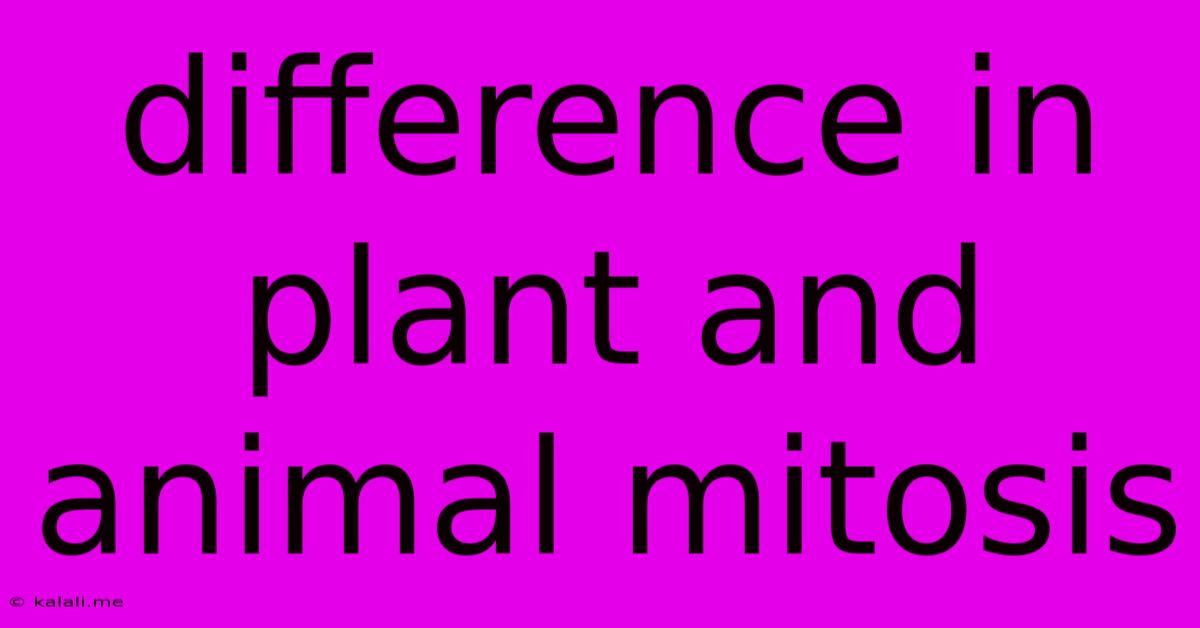Difference In Plant And Animal Mitosis
Kalali
Jun 12, 2025 · 3 min read

Table of Contents
The Great Divide: Key Differences in Plant and Animal Mitosis
Mitosis, the process of cell division resulting in two identical daughter cells, is fundamental to life. While both plants and animals undergo mitosis, there are some crucial differences in the process due to their distinct structural features and needs. Understanding these differences offers insight into the fascinating intricacies of cellular biology. This article delves into the key distinctions in plant and animal mitosis, focusing on cytokinesis, the final stage of cell division.
Understanding the Basics: A Quick Recap of Mitosis
Before we explore the differences, let's briefly review the stages of mitosis common to both plant and animal cells:
- Prophase: Chromosomes condense and become visible, the nuclear envelope breaks down, and the mitotic spindle begins to form.
- Metaphase: Chromosomes align at the metaphase plate (the equator of the cell).
- Anaphase: Sister chromatids separate and move to opposite poles of the cell.
- Telophase: Chromosomes decondense, the nuclear envelope reforms around each set of chromosomes, and the mitotic spindle disassembles.
Cytokinesis: Where the Plant and Animal Worlds Diverge
The most significant difference between plant and animal mitosis lies in cytokinesis – the division of the cytoplasm to form two separate daughter cells. This difference stems from the presence of a rigid cell wall in plant cells, absent in animal cells.
Animal Cell Cytokinesis:
- Cleavage Furrow Formation: In animal cells, cytokinesis begins with the formation of a cleavage furrow, a constriction around the middle of the cell. This furrow is created by a contractile ring of actin filaments beneath the cell membrane.
- Cell Membrane Pinch: The contractile ring gradually tightens, pinching the cell membrane inwards until the cell is divided into two. This process is akin to tightening a drawstring bag.
- Rapid Process: Animal cell cytokinesis is a relatively rapid process, often completed within minutes.
Plant Cell Cytokinesis:
- Cell Plate Formation: Plant cells, encased in a rigid cell wall, cannot undergo cytokinesis via a cleavage furrow. Instead, a cell plate forms in the middle of the cell. This plate is constructed from vesicles derived from the Golgi apparatus, which fuse together to create a new cell wall.
- Cell Wall Synthesis: The cell plate gradually expands outwards, eventually fusing with the existing cell wall, completely separating the two daughter cells. This process involves the deposition of cellulose and other cell wall components.
- Gradual Process: Plant cell cytokinesis is a more gradual process compared to animal cells, taking longer to complete.
Here's a table summarizing the key differences:
| Feature | Animal Cell Mitosis | Plant Cell Mitosis |
|---|---|---|
| Cytokinesis | Cleavage furrow formation | Cell plate formation |
| Mechanism | Contractile ring of actin filaments | Vesicle fusion and cell wall synthesis |
| Structure | Cell membrane indentation | Cell plate expansion |
| Speed | Relatively rapid | Relatively slow |
Beyond Cytokinesis: Other Minor Differences
While cytokinesis is the most prominent difference, some minor variations exist in other stages of mitosis between plant and animal cells. These include differences in the organization of the microtubules during spindle formation and the precise timing of certain events. However, the fundamental mechanisms remain largely conserved across both types of cells.
Conclusion:
While both plants and animals utilize mitosis for cell division and growth, their respective processes reflect their unique cellular structures and needs. Understanding these differences, particularly in cytokinesis, is crucial for comprehending the diversity of life at the cellular level. The contrasting mechanisms of cytokinesis in plant and animal cells highlight the adaptability of fundamental biological processes to diverse environmental challenges and structural constraints.
Latest Posts
Latest Posts
-
Which Of The Following Is Matched Correctly
Jun 13, 2025
-
Whats The Difference Between Pounds And Kilograms
Jun 13, 2025
-
What Is The Unit Of Measurement For Displacement
Jun 13, 2025
-
Water In Gas Form Is Called
Jun 13, 2025
-
Which Seismic Waves Cause The Most Damage
Jun 13, 2025
Related Post
Thank you for visiting our website which covers about Difference In Plant And Animal Mitosis . We hope the information provided has been useful to you. Feel free to contact us if you have any questions or need further assistance. See you next time and don't miss to bookmark.